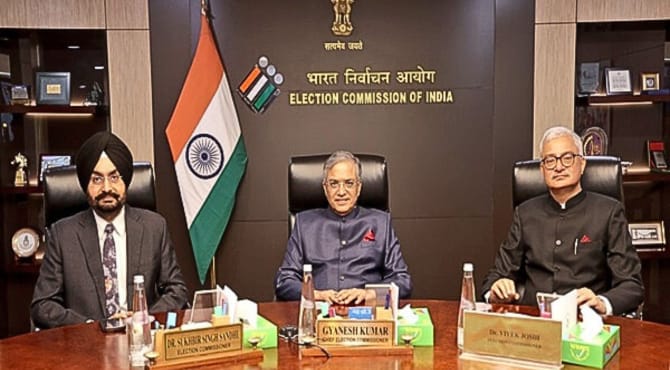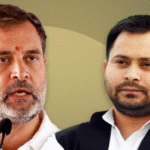The Election Commission of India (ECI) is on the move for a Special Intensive Revision (SIR) of electoral rolls across the nation. The colossal exercise will be rolled out in phases.
Each phase will cover around three months. Given that the last intensive revision was conducted more than twenty years ago, this is a significant move to ascertain the correctness and freshness of the voter list.
Why a nationwide SIR is needed
India’s democracy thrives on proper and fair elections. The prerequisite for this is that the voter rolls should be correct and without any drawbacks, such as the duplicate recording, outdated, or ineligible voter entries. The population movements, urban migration, and illegal settlements have been making voter verification difficult in the last few years. The present SIR is expected to bring about a perfect cleaning and updating of the rolls through mapping those who can vote now with the entries from the 2003–2004 rolls that were last used during the previous large-scale revision.
For example, in Bihar, such an undertaking was brought to a successful conclusion in the first part of the year. Around 80% of voters were able to be linked with previous rolls, and the remaining 20%, that is mostly the first-time voters plus people who had to prove their eligibility and same wad confirmed via proper documentation. The experience was efficient and exact, thereby showing that these revisions have the potential to immensely increase the dependability of electoral data.
Priority states and phased rollout
By stages, the ECI has mapped out the SIR implementation. Thus, Jammu & Kashmir and Ladakh, both of which will be covered in snow soon, will be done later. The first attention will be on the states that will hold their assemblies elections next year. Hence, the ECI will initially work in West Bengal and Assam, two states where electoral roll accuracy is paramount.
Over the years, illegal migration, especially from Bangladesh, has been the major factor behind the electoral-related problems of these two states. It is mostly through the usage of Aadhaar and other local papers that non-citizens may have successfully registered as voters. Besides threatening the integrity of the electoral rolls, this makes the social balance insecure.
Moreover, many people from these states, including both genuine citizens and undocumented migrants, tend to move to cities with better economic opportunities such as Noida, Delhi, Jaipur, Chennai, Kochi, and Hyderabad. Because of this migration, their names may appear on multiple rolls, or they may register in new locations without proper verification. The SIR will help identify and correct such cases.
ECI’s conference on preparedness
Chief Election Commissioner Gyanesh Kumar, along with Election Commissioners Dr. Sukhbir Singh Sandhu and Dr. Vivek Joshi, were at the helm during a two-day conference of Chief Electoral Officers (CEOs) held by the ECI at the India International Institute for Democracy and Electoral Management (IIIDEM) in New Delhi to discuss the smooth and uniform execution of the exercise.
During the conference, the Commission:
- Checked the progress of different states and Union Territories on mapping current electors with the previous SIR rolls.
- Evaluated the training and induction of DEOs, EROs, AEROs, BLOs, and BLAs.
- Discussed the acceptance of documents for proving identity, citizenship, and residence. The Aadhaar card will be accepted only as identity proof; other documents will be required to confirm citizenship and address.
The Commission indicated that although a standard list of 11 documents would be referred to, states can incorporate other local documents if necessary.
The forthcoming nationwide SIR is more than just a technical revision of electoral rolls; it is a vital step towards the empowerment of the Indian democratic structure. Given the extensive internal migration, urbanization, and illegal entries concerns, this activity will verify that only those who are eligible will be registered as voters.
A well-planned, staggered pan-India SIR is both necessary and feasible. It will update 20+-year-old records, handle internal migration flows, and target areas of concern like West Bengal and Assam in a legal, non-discriminatory way. The Bihar exercise shows this can be done efficiently if officials are trained, documents and SOPs are clear (Aadhaar as ID only; alternate proofs needed for citizenship/residence), and targeted work is done in both origin and destination areas for migrants. Doing this now — quickly but carefully — will protect the franchise and strengthen public trust in the rolls ahead of the crucial 2026 assembly elections.
In the political landscape, the situation resembles what was seen in Bihar, where parties like the RJD, Congress, and CPI(M-L) stood together in opposition to the process. The matter even reached the Supreme Court, highlighting the depth of political contention and institutional involvement. Although some issues arose during the process, but those were efficiently and transparently solved by the Election Commission. The Election Commission also came under scrutiny for its handling of certain procedures. The process was transparent to the extent that no official complaint was registered from Congress party.
However, in West Bengal, the political dynamics will be quite different. Here, the contest is not just institutional but deeply personal, as Mamata Banerjee herself stands at the forefront of the battle. The respect and response of the people in the state will differ from Bihar’s scenario, shaped by regional sentiments and leadership style. Each state presents its own complex web of alliances, opposition, and governance challenges, creating a distinct narrative of political struggle and public accountability.
The success of the process lies in the acceptance of the need to update the electoral roll and consensus among the stakeholders with respect to the ways and means of the process. Political commentators agree that since Mamta Banerjee has already started to oppose the process, she will take the matter to the Supreme Court. However, much of the problems have already been solved by the Election Commision in Bihar and that will serve as a guidance.









